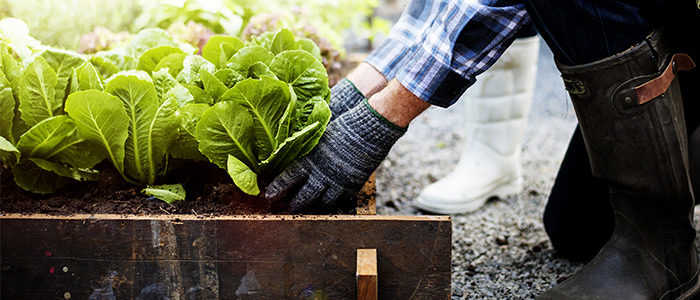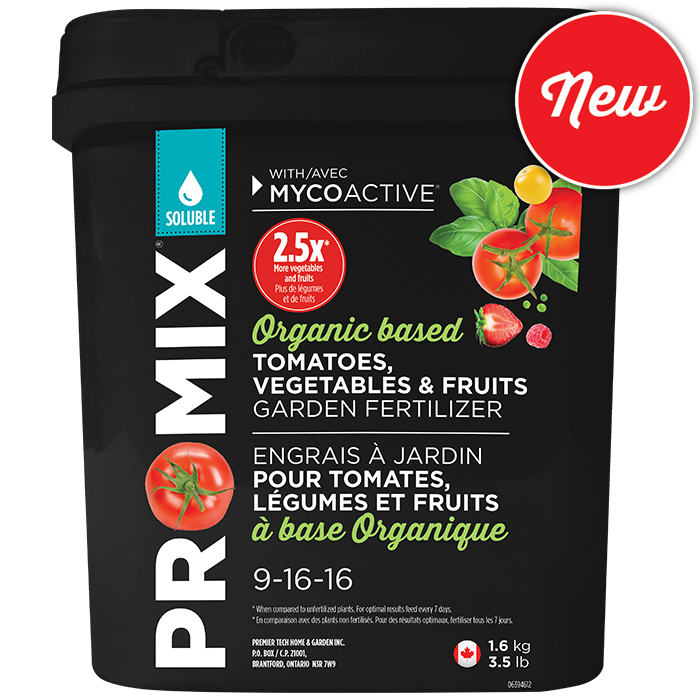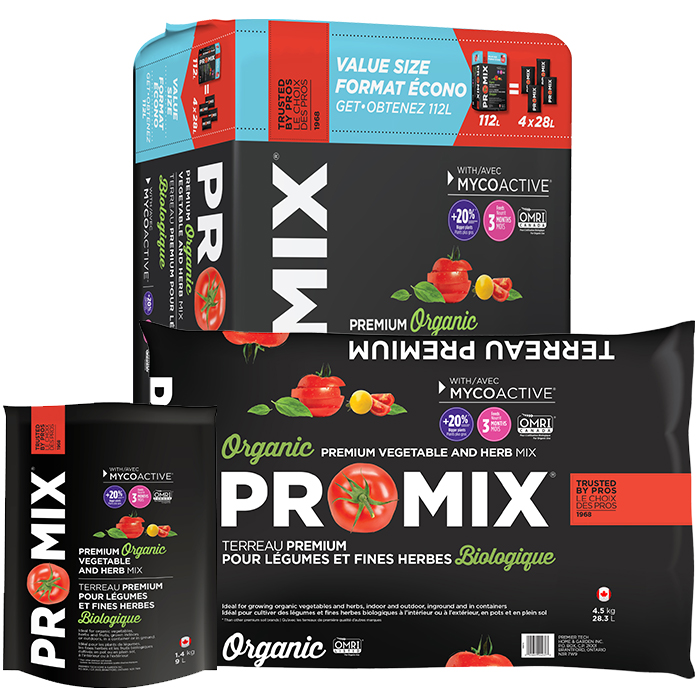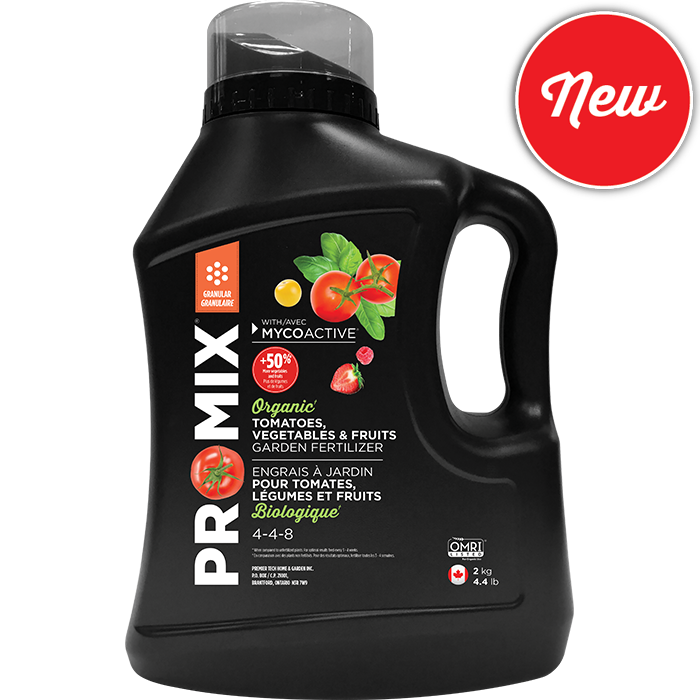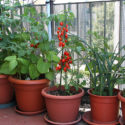The trend in growing edibles has been very popular. More people are choosing to dedicate their outdoor spaces, or significant portions of it, to edible gardening. Growing edibles is incredibly rewarding (and tasty) but can still present challenges. Many edibles can be prone to leaf disease and insects. The best way to prevent or minimize these problems and ensure you get the best yield, is to ensure proper nutrition in your soil.
Plants need three things to grow: light, water, and nutrients. Picking a sunny spot, and ensuring you’re watering properly are key, but neither will compensate for a lack of nutrients. Plants need nutrients to support their biological processes. Many of the problems with edibles occur because of a nutrient deficiency; effectively their immune system is compromised and so they are more susceptible to fungus and attacks from insects. We need to add nutrients to the soil in order to make sure the plants have what they need to survive and thrive.
The three key elements for plant growth are nitrogen, phosphorus, and potassium. When you look at a bag of fertilizer (and often soil), you see three numbers that correspond to the percentage of each of those elements in the product (referred to as the NPK numbers). Nitrogen helps plants with their green growth, particularly leaves. Phosphorus helps with the development of flowers, fruit, and roots; all of which are very important for edibles. Potassium is a bit more all-purpose for supporting a plant’s immune system, as well as helping with root growth and reinforcing stems. Generally speaking, fertilizers for edibles will be higher in phosphorus and potassium and lower in nitrogen because we’re trying to encourage the growth of flowers, roots, and fruit.
Before you plant, the most important aspect of balanced nutrition is ensuring that you’re using the right soil for edibles. Most edibles want a soil high in organic matter and that has good water retention. Simply speaking, organic matter is stuff that used to be alive; for example, decomposed plant matter and animal waste. Nutritionally speaking, organic matter provides the NPK in modest amounts, but more importantly a whole host of micronutrients which plants need in smaller numbers to ensure optimal functionality and health. Organic matter also helps to improve the texture of soil to make roots grow better and will help with water retention, meaning you need to water less often. Organic is also a haven and food source for microbes and scavengers (eg: worms), which are beneficial to soil and plant health.
If you’re planting your edibles in the ground, the best way to add organic matter to the soil is by adding compost. You can make your own compost by using kitchen scraps and yard waste, or you can purchase bagged compost like PREMIER® BIOMAX® Ultra Composts & Composted Manures. Bagged compost is usually manure from cattle and sheep, but my personal favourite is the PREMIER® BIOMAX® Ultra Compost Shrimp Mix. I really like the PREMIER® BIOMAX® Ultra products because they are completely composted – which is important because fresh compost can burn plants. PREMIER® BIOMAX® Ultra products are certified by the Compost Quality Alliance (CQA). This provides assurance that you are buying a reliable and high quality compost product that was processed according to strict composting standards mandated by the Compost Council of Canada. You should amend your soil every year with generous quantities of compost to ensure nutrient balance.
If you’re growing in containers, bagged soil mixes like PRO-MIX® Organic Vegetable and Herb Mix, take all the guesswork out of getting the right nutrient balance. It’s a light, rich mix, with peat moss, a lot of compost, as well as organic slow-release fertilizer and MYCOACTIVE, a natural root growth enhancer. You should replace at least 50% of your container with fresh soil yearly to maintain proper water drainage and make sure there are enough nutrients.
Once the season gets going, if your edibles are in the ground, you want to fertilize at the time of planting with slow-release fertilizer like PRO-MIX® Organic Tomatoes, Vegetables, and Fruit granular fertilizer. It’s quick and easy to apply. All you do is sprinkle the granules around the roots and under a thin layer of soil and it slowly breaks down into the soil with watering. Depending on the crop and frequency of watering, it should last for about 3 months; so if you are growing a longer-season crop (like winter squash, leeks, or late cabbage) you’ll need to reapply late summer. If you’re planting in containers and use specially-formulated soil for edibles, you don’t need to fertilize right away as there is a slow-release fertilizer included in the mix. Six-to-eight weeks into the season you’ll want to start using a water-soluble fertilizer like PRO-MIX® Tomatoes, Vegetables and Fruit water soluble fertilizer to make sure that your plants continue to grow properly, as container gardens tend to lose their nutrients a bit faster due to the frequency of watering that is required. Water soluble fertilizer is also easy to apply. Simply mix the powder in a watering can or hose-end sprayer and water it on every 2 weeks.
The most common problem with tomatoes is a fungus called blossom-end rot, which leaves a black splotch on the bottom of your tomatoes. That is caused by a calcium deficiency in the soil. The PRO-MIX® Organic Vegetable and Herb soil includes gypsum, which has a lot of calcium in it, so that should reduce the problem in containers. In the ground, the BIOMAX® Ultra Compost Shrimp Mix has a lot of calcium in it, another reason why I like it. The other great way to augment the calcium is to use Green Earth Bone Meal, which is very slow-release organic fertilizer. It needs to be applied early in the season or in the fall for the benefit of the following season.
Fertilizing is easier than it used to be and the quality of fertilizers available is top-notch. PRO-MIX® soil, PRO-MIX® granular fertilizer, and Green Earth Bone Meal are certified organic, the BIOMAX® CQA certification means they are safe for edibles, and the PRO-MIX® water soluble is organic-based, so this combination of products means you should feel confident using them with your edibles for productive and tasty yields.
